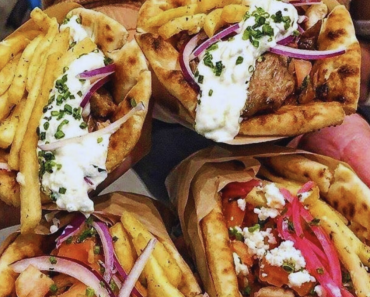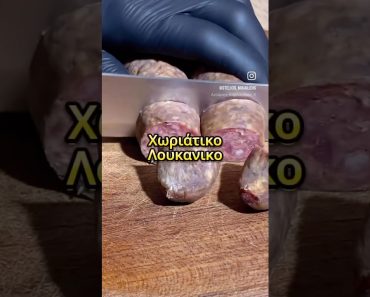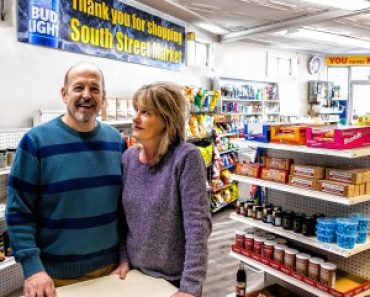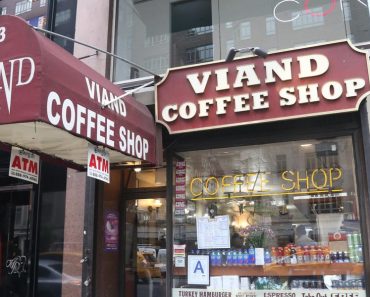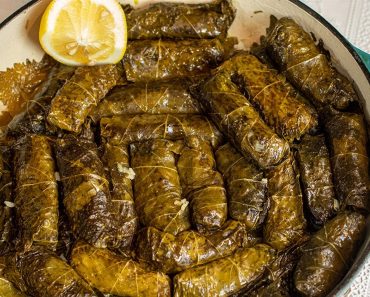It was all hands on deck last weekend on North Hobart’s Federal Street, as around 150 volunteers served crowds of multiple times their number, at Tasmania’s annual Greek Festival.
“We’re only a small community, so 150 [volunteers] might not sound much, but it is a large proportion of our community,” Estia Festival organiser Emanuel Roussos told Neos Kosmos.
“Every year it gets harder” to recruit volunteers and “you can never have enough”, Roussos admitted.
“But we get through on the day, people always turn up.

“And this year we had a real positive response from the youth. This encourages us because they’re starting to take over the reign and we know that the festival and the community is in good hands.”
The Estia festival has secured state government funding until 2027, with the rest of the cost covered by sponsors.
“That money only goes part of the way. Otherwise, it’s just our members, our volunteers, our mothers and grandmothers some well in their 80s, that’s how it gets done,” Roussos said.

The two-day event saw young people taking on multiple roles.
Like Elleni Kothris and Elianna Diafokeris who worked together in the stalls on Saturday barbequing octopus and then on Sunday performed with the Hellenic Dancers Senior group.
“To be able to showcase my tradition dancing and connect to our heritage [is really important to me],” Diafokeris said.
For the 17-year-old, volunteering at the octopus stall was not a chore.

“It allowed us to share Greek food but also make a stronger Greek community as we help each other, laugh and enjoy ourselves during Estia.”
Kothris, 19, sees the festival as a “place of belonging” that “creates lifelong bonds”.
“I hope to carry traditions of our community and help create a positive, lasting impact for years to come,” she said.

This was the 29th year that Hobart’s Greek Orthodox Church & Benevolent Society of St George ran the event. And it was the first time it was spread across two days instead of one.
Organisers did not regret it.
“I could say it’s probably the biggest one we’ve ever had,” Roussos said.

“There was a Chinese New Year Festival 10 minutes down the road and up in Launceston, they had a big food and wine festival as well. So, you know, we’ve had a bit of ‘competition’ but still we exceeded expectations.”
The street festival featured separate acts for Saturday and Sunday.

But it was all there: a feast of Greek flavours, traditional performances by Hobart’s Hellenic Dancers, live music, DJ sets, a twilight market and more.
The community also managed to secure a special guest this year.
Archbishop Makarios flew to Tasmania solely for the weekend event, despite having just returned from his Cuba visit.

A 19-year-old volunteer, Maria Papadelias, was assigned the task of interviewing the Archbishop, in between setting up stalls, helping with the event’s social media promotion and dancing on stage.
She asked him about the importance of coming together as a community, a topic close to her heart.

“It’s such a special opportunity to represent our community and showcase what the Greeks have to offer here in Tasmania,” Papadelias told Neos Kosmos.
“Throughout the year, we perform at many events, but Estia is definitely my favorite.
“There’s nothing like the feeling of performing in front of a crowd, feeling the energy of the music, and dancing alongside friends who have become like family.”

The weekend celebration was the headline event of the Estia 2025 program, which covers from sports to lectures, film screenings and culminates into a taverna night.
Tasmania’s Greeks may not be great in numbers but they’re a close-knit community.
They have been running this festival since 1994. The inaugural event was themed “two-cultures” in a bid to demonstrate the integration of Greek and Australian cultures in the island state.

For Andrew and Katina McMaster, celebrating their heritage in Estia has taken on a more personal meaning in recent years, after the siblings lost their mother, Irini Kalis and their grandmother Helen Kalis.
Both were active members of the community with Irini having served in the Estia Festival’s organising committee.

“For years, I have been a part of the festival with my late mother and as a Hellenic Dancer. After she passed, it was difficult to return without her, as she was such a central part of the festival for myself and others,” Katina McMaster told Neos Kosmos.
“Now, continuing something she and my grandmother were so passionate about is incredibly rewarding.”
Andrew McMaster said he found the channel he was looking for to keep his ties to the community strong.

“Since my mum and yiayia passed, I need to actively seek connection to my Greek side. That’s why I wanted to get involved, to stay connected.”
Working in digital marketing, the 28-year-old professional said he wanted to provide his skills to help Greek Tasmanians connect.
“And I think the thought of working to build a stronger community is really exciting.”

Late Helen Kalis, shared this excitement, McMaster said.
“My yiayia was compiling research on the Greek community and was hoping to publish a book. It never happened before she died but I shared some of her research online.”
The webpage hosting yiayia Helen’s research features some of her own words on the community’s evolution.

“The skills that have been handed to the first-generation Greek born Tasmanians by their parents must be preserved and taught to the next generation.
“The future of the Greek Community is in their hands,” Helen Kalis had said in 2013.
McMaster said his yiayia’s testimonial “hit the nail on the head” as he reflected on another year of Estia coming to fruition.
“I’m leaving this weekend and my heart is full, I’m really proud of our community, and I know mum and yiayia would be too.”




